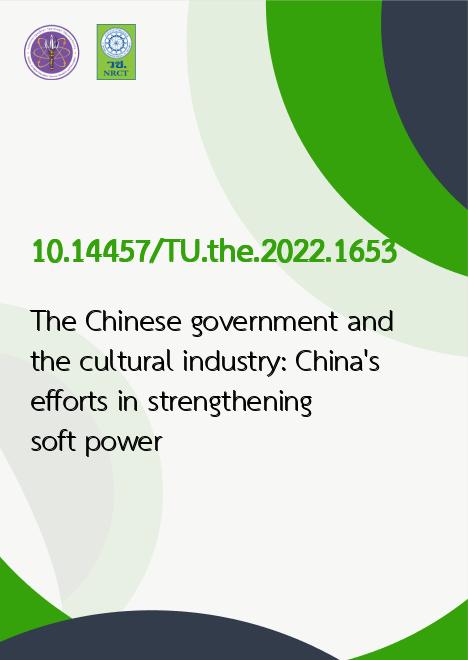
|
The Chinese government and the cultural industry: China’s efforts in strengthening soft power |
|---|---|
| รหัสดีโอไอ | |
| Title | The Chinese government and the cultural industry: China’s efforts in strengthening soft power |
| Creator | Parinchat Traipanyasart |
| Contributor | Kitti Prasirtsuk, Advisor |
| Publisher | Thammasat University |
| Publication Year | 2565 |
| Keyword | China, Soft power, Cultural industry, Chinese movies, Chinese series, Media control |
| Abstract | China came to value soft power as a means to influence positive international public opinion toward China and to improve its national image. Regarding culture as a significant soft power resource, in recent years, China has made numerous efforts to popularise Chinese culture, one of which is through the “going out” initiative. Aiming to disseminate China’s voice to the world, films and TV series represent key cultural products that help communicate with foreign audiences. With the increasing visibility of Chinese films and TV series in the international market, this research examines the Chinese government’s role in promoting the cultural industry, particularly movies and television/online series, as a way to boost China’s soft power. It also analyses the messages China aims to convey through films and dramas to see its attempt to build China’s image. In so doing, the research adopts soft power as a framework to answer the research question: How does China promote its entertainment industry to expand its international influences? The thesis argues that the Chinese government plays a significant role in reforming its cultural industry by privatising the entertainment industry and facilitating the production and distribution of films and TV dramas abroad, so as to enhance competitiveness in the international market. The term “cultural industry” was featured in the 11th Five-Year Plan as a vital element of the country’s economic policy. This transformation allows entertainment companies to operate using a more competitive business model, by which they must create profitable products. The regulations and controls have also been reduced, leading to a dynamic change and diversification in the contents of online dramas, to the extent that online homosexual novels were adapted into live-action series. Accordingly, such series can attract more audiences, resulting in increased popularity internationally. This became possible because of the government’s ambition to digitalise China, including digital media platforms. With the launch of the Internet Plus initiative, online streaming technologies and platforms have become significant distribution channels for Chinese entertainment media. However, China’s soft power is not only limited to the international public; thus, films and dramas serve two targeted groups, Chinese and international audiences. Therefore, the government maintains its control over the contents of certain entertainment products, especially films shown in movie theatres. The messages embedded in movies and dramas rotate around nationalism to win the CPC legitimacy from domestic audiences. Also, they represent narratives that are in line with China’s foreign policies, such as Peaceful Rise and Harmonious World, to portray China’s positive side and influence the international viewers’ opinion. Such control over the content of entertainment media underlies China’s paradox of soft power. On the one hand, the party views film and dramas as tools to infuse socialist values and to safeguard the country’s ideology at home; on the other hand, China tries to influence global public opinion through entertainment shows which are known to be heavily controlled by the authorities, thus undermining their credibility. |